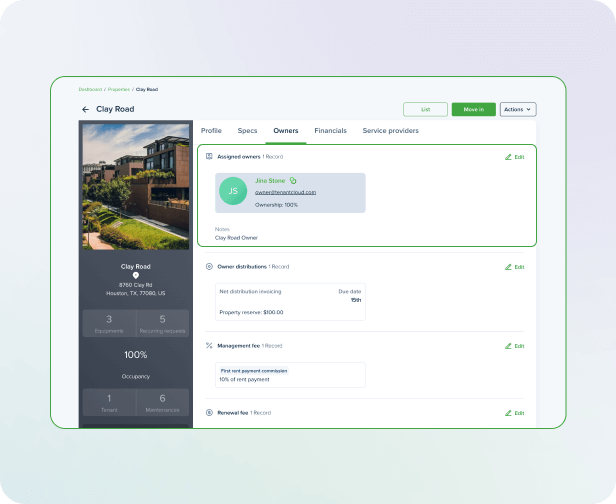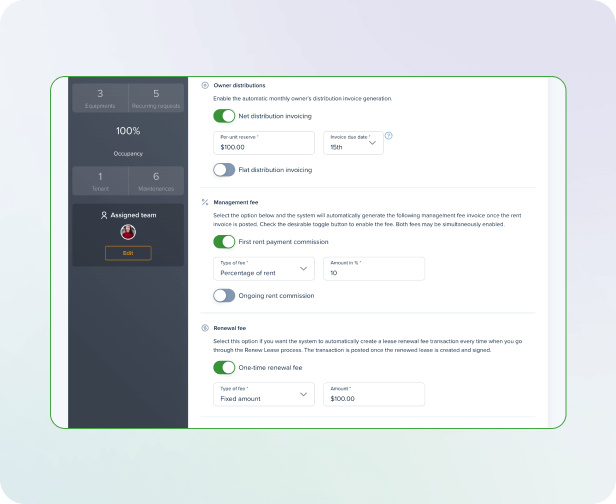Property Manager
All-in-One Software for Busy Property Managers
Fill vacancies, collect rent, and manage your entire workflow from one easy dashboard. Property managers save up to 9 hours a week on average with TenantCloud’s Team Management tools.

Rental management tools for the whole team
Built-in workflow tracking
Assign specific tasks to team members, create custom permissions, and track every actionable item, in real-time.
Read moreSeparate owner portal
Keep owners in the loop, 24/7, with their own account. From sending reports to signing documents to approving fees—it’s all done inside their own dashboard.
Read moreTeam calendar sync
Stay on track as a team with a visual timeline of upcoming tasks, important dates, and more. Sync with Google Calendar for ultimate collaboration.
Read moreKeep property owners in the loop
Create rental reports and get them sent, seen, and approved in seconds.
Assign Properties: Connect owners to their properties for easy organization. Learn more
Share Reports: Compile a variety of property reports and share them directly. Learn more
Get Approvals: Send maintenance requests and get repair costs approved in record time. Learn more

Manage any fee, anytime
Set management fees automatically, giving you more time to manage what matters most.
Owner Distributions: Set owner fees automatically for easy business financing. Learn more
Management Fees: Generate auto invoices for property managers on rent day. Learn more
Renewal Fees: Send renewal fee invoices to owners when a lease is renewed, saving time and paperwork. Learn more

- Online Rent Payments
- Maintenance Management
- Listings and Applications
- Enhanced Reporting
- Move In/Out Inspections
- Property Message Board
- Team Management & Tools
- Task Management
- User-Interface Customization
Prices exclude any applicable taxes.
FAQs
How can lease management software benefit property managers in their daily tasks
A landlord may hire a property manager to handle daily operations. These include collecting rent from tenants, determining reasonable rent prices for the area, searching for new residents, tenant screening, organizing leases and agreements, and keeping track of maintenance needs.
The four fundamental aspects of property management are maintenance and repairs, rent and fee collection, leasing and paperwork, and property inspection. Additional aspects include sales, third-party services, property listings, and evictions.
Each property has its unique requirements. Property managers may perform duties like:
- Set competitive rent prices to draw in prospective tenants.
- Attract and screen potential renters.
- Coordinate lease agreements and security deposits.
- Collect rent and follow up on non-payment.
- Manage maintenance requests and move-in/move-outs.
- Maintain the physical state of the property.
- Hire and manage service professionals.
- Maintain a budget for the property (for repairs and maintenance).
- Manage all paperwork, including leases, requests, insurance, and maintenance records.
The main difference between landlords, property owners, and property managers is that, while adhering to all applicable federal, state, and local landlord-tenant regulations and laws, a property manager is also accountable for the finances and records of an entire portfolio of various owners, renters, and properties.
How can property manager software help managers with their daily tasks?
The property manager app helps property managers stay organized for day-to-day tenant communication and property management. Property management software can also simplify preparations for tax season.
Our rental property management software allows managers to find, vet, and manage renters, handle their maintenance needs, collect rent payments online, and keep track of all the costs and income that go along with it. Here’s how property manager software makes life easier:
- Finding New Tenants
Tenant management is one of the real estate property manager's primary duties. Finding and attracting renters is an essential part of tenant management. With the help of a property manager app, you can promote rentals and submit eye-catching advertisements to your personal listing website and other rental advertising venues.
As a property manager, you always look for ways to improve business, so you should consider tenant screening. Our property management software offers comprehensive services, including tenant screening.
A tenant screening report helps property managers choose the best applicant for a vacant rental unit. There must be more than just reviewing a tenant's rental history and asking a few questions to make a well-informed decision. Tenant screening is the most effective way to distinguish desirable tenants from undesirable ones.
- Dealing with Complaints
Typical property management duties include maintenance and responding to concerns. To maintain a good relationship with your tenants, consider using additional property manager tools to resolve maintenance issues quickly. TenantCloud offers built-in maintenance management that helps to better deal with maintenance issues.
- Coordinating Tenant Turnover
Coordination of tenant turnover is one of the duties of a property manager. Property managers must coordinate when tenants move in and out. Before new renters move in, property managers must inspect the rental space for damage, make necessary repairs, and arrange for cleaning.
TenantCloud lease management software has all the universal landlord forms and keeps them organized and easily accessible. These documents include the Inspection Checklist Addendum, a 24-hour Notice to Enter, and more. We offer all the documents every property manager may need for their rental properties.
- Accounting
One of the most crucial responsibilities of a property manager is collecting rent and ensuring that the entire rental portfolio is in good standing and that any late fees are billed.
The property manager may also raise or lower the rent yearly based on market conditions. The TenantCloud property manager app will automatically create invoices and receipts. All you have to do is to set up an invoicing schedule.
Property managers who start using TenantCloud can benefit from the following property manager tools:
- Streamlined communication channels with tenants
- All paperwork and documents in one place for better record-keeping
- 24/7 access to the online platform or dashboard
- Collect rent online
- Fewer expenses
- Utilizing data and analytics
- Happier tenants with better technology and software
From communication to annual financial reports and property upkeep, lease management software TenantCloud allows you to manage properties in one place.
Why is it important to screen tenants?
To ease the burden of dealing with problematic tenants, property managers must complete a tenant screening to ensure leases are enforced, properties are well taken care of, and rent is paid on time.
Management must uphold the owner's request for tenant screenings to find a tenant who will pay rent on time, honor the lease terms, and maintain the property in good condition. Screening tenants entails verifying their income and employment status, running credit and criminal record checks, and verifying that they have an excellent rental history.
Pre-screening questions for tenants remove candidates who need to meet the rental criteria and may be unable to lease a home.
Tenants who have shown an interest in renting the property should complete a pre-screening questionnaire. Don't risk accusations of prejudice by treating each prospective tenant equally; make it a part of every application with the help of lease management software.
We suggest asking pre-screening questions to make sure your property is in the right hands. Candidates may intentionally give evasive answers, recall only certain information, or makeup answers if unsure. Pre-screening questions make it easy to attract quality tenants, vet them, and save time and money in the long run.
There are some questions landlords are not allowed to ask potential renters because of the Fair Housing Act (FHA) (42 U.S. Code § § 3601-3619 and 3631). The FHA prohibits discrimination based on age, country of origin, marital status, sexual orientation, and other details. Check local and state landlord-tenant laws for extra precautions and familiarize yourself with the FHA beforehand to understand what you cannot ask renters.
How can property management software be used to help management teams?
TenantCloud’s Team Management functionality allows you to assign your property to specific sub-admins, giving them access to the respective properties and sections. They have everything they need and nothing they don’t.
- Team Messaging
With the help of Team Messaging, you can communicate with team members and share attachments in one chat to make business decisions faster and more efficiently.
- Task Management
Task Management lets you manage and track tasks by assigning them to your team members.
- Team Calendar
Be on the same page with your team members with access to one calendar and coordinate your team based on availability.
- Team Tracking
Team tracking will monitor individual members' contributions to business operations.
What are owner distributions and management fees?
Property management fees are paid to the property management company to take care of and maintain the rental property. Commonly, the first rent payment commission may differ from the ongoing one. These fees might be a percentage of the monthly rent or a fixed price. Here is the list of the most common types of property management fees.
Monthly Rent Percentage
The typical monthly fee for property managers is from 4% to 12% of the monthly rent received. For example, you would pay a management fee of $120 (10% fee) if your house rents for $1,200 a month.
Property managers frequently charge an initial, one-time fixed fee or a percentage of the monthly rent once the vacant property is leased to a new tenant.
Flat Property Management Fee
Some property management companies utilize a flat fee rather than calculating costs as a percentage of your monthly rent. A flat property management fee is typically determined by the type of property, its square footage, and the individual property management services.
A single-family home fixed fee is typically around $100 per month. Prices can differ based on the specific market conditions. The straightforwardness of a flat fee structure may make it seem like the best option. Still, it's crucial to remember that the property manager utilizing this model might need to be motivated in other ways to increase the rental income.
Additional Fees:
- Initial Account Setup Fee: This varies among property managers and might cover tasks such as initial tenant notifications and property inspections.
- Maintenance Fee: Typically included as part of the monthly management fee for ongoing property upkeep.
- Eviction Fee: Applicable if the property owner requires the property manager to handle evictions. It often consists of a fixed flat fee and associated court costs.
- Early Termination Fee: Depending on the manager's agreement, this fee is incurred if the owner terminates the property management agreement prematurely. It usually equals at least one month's property management fee.
- Renewal Fee: Renewal fees can be charged after the renewal lease is created and signed. There are two types of renewal fees: a flat fee and a percentage-based fee. For a flat fee, property managers can charge a fixed payment (typically $250-$500) for each renewed lease. A percentage-based fee can range from 25% to 75% of the total rent. A renewal fee encourages the property management company to do everything possible to retain quality tenants.
Owner distribution fees are the rental income disbursements to property owners. There are two primary types of owner distribution methods:
1. Net Owner Distribution: The distribution amount to property owners is automatically calculated based on the income and expense difference and the required property reserve amount for each property. It's normal for owner distributions to be on a 30-day delay since most property managers schedule owner distributions after the 20th of each month.
2. Flat Owner Distribution: The flat owner distribution method is when a property management company pays out a set amount to the owner each month rather than the net amount owed after all property expenses have been paid.
